Eva Braun
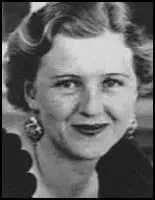
Eva Braun, the middle of three daughters of Friedrich Braun (1879-1964) and Franziska Kronberger (1885-1976), was born in Simbach, Germany, on 6th February, 1912. Her father was a master craftsman. Her sisters were Gretl Braun and Ilse Braun.
Eva worked as an assistant in the studio of Heinrich Hoffmann. In 1932 she met Adolf Hitler. Eva later told her sister: "I'd stayed on after closing time to file some papers and I'd climbed up a ladder to fetch the files kept on the top shelves of the cupboard. At that moment the boss came in accompanied by a man of uncertain age with a funny moustache, a light-coloured, English-style overcoat and a big felt hat in his hand. They both sat down on the other side of the room, opposite me. I tried to squint in their direction without appearing to turn round and sensed that this character was looking at my legs... That very day I'd shortened my skirt, and I felt slightly embarrassed because I wasn't sure I'd got the hem even." Hoffmann sent her out to buy beer and sausages, and then invited Eva to join them: "The elderly gentleman (Hitler) was paying me compliments. We talked about music and a play at the Staatstheater, as I remember, with him devouring me with his eyes all the time. Then, as it was getting late, I rushed off. I refused an offer of a lift in his Mercedes. Just think what Papa's reaction would have been!"
Henriette Hoffmann knew Eva Braun, who worked in her father's studio. She recalled that "Eva had pale blonde hair, cut short, blue eyes, and, although she had been educated in a Catholic convent, she had learnt feminine wiles - a certain look, and swaying hips when she walked, which made men turn their heads.... She was given theatre tickets like I was, and she thanked him with a curtsey." Baldur von Schirach later commented: "Eva was a worldly type of girl - bobbed chestnut-brown hair, a make-up that was unconventional for the time, fashionable pullover and short, narrow skirts, silk stockings and high-heeled shoes. I took her for a French girl. Usually she was walking a boxer dog. For me she was the most beautiful girl in Munich."
Eva's sister, Ilse Braun, claims that she did not talk much about her relationship with Hitler: "We Braun girls were not very communicative when it came to the details of our private lives. Even among ourselves, in the sanctum of our bedroom, we rarely spoke about our relations with men. There was a very strong barrier of puritanism, perhaps because of our convert education, perhaps because of the Victorian ideas of our parents. I knew that Eva sometimes went out with Hitler, but I knew nothing about the state of her feelings."

.
David Pryce-Jones, points out that Eva Braun was not alone in finding Hitler physically attractive: "Women by the thousand abased themselves at Hitler's feet, they tried to kiss his boots, and some of them succeeded, even to the point of swallowing the gravel on which he had trod, according to Reck-Malleczewen, whose fastidious hatred of the vulgarian Hitler was genuinely conservative. As a figurehead, as a male in absolute power, Hitler's aphrodisiac effect was scarcely even sublimated in the more impressionable women who constituted his beloved mass audience. They moaned, they were hysterical, they fainted, for an introspective bachelor deficient in sexuality.... In one respect Hitler was a final item in an intimate treasure-hunt, the object which could never be brought home, and in another respect he was a historical Big Daddy, patting the heads of blonde children. Restraint was impossible, in the frustration of apparently approaching the unapproachable; this was, so to speak, a masturbation of the spirit. She had herself to display."
At the time Hitler was romantically attached to Geli Raubal, the daughter of his half-sister, Angela Raubal. Hitler, who had now turned forty, became infatuated with Geli and rumours soon spread that he was having an affair with his young niece. Hitler became extremely possessive and Emil Maurice, his chauffeur, who also showed interest in Geli, was sacked. Although she was 20 years old, she looked very young for her age. Patrick Hitler, Adolf Hitler's nephew, met Geli Raubal during this period: "Geli looks more like a child than a girl. You couldn't call her pretty exactly, but she had great natural charm. She usually went without a hat and wore very plain clothes, pleated skirts and white blouses. No jewellery except a gold swastika given to her by Uncle Adolf, whom she called Uncle Alf."
Wilhelm Stocker, an SA officer, was often on guard duty outside Hitler's Munich flat, later told the author of Eva and Adolf (1974): "Many times when Hitler was away for several days at a political rally or tending to party matters in Berlin or elsewhere, Geli would associate with other men. I liked the girl myself so I never told anyone what she did or where she went on these free nights. Hitler would have been furious if he had known that she was out with such men as a violin player from Augsburg or a ski instructor from Innsbruck. After she was satisfied that I wouldn't tell her uncle - and I had a personal reason for not telling him - she often confided in me. She admitted to me that at times Hitler made her do things in the privacy of her room that sickened her but when I asked her why she didn't refuse to do them she just shrugged and said that she didn't want to lose him to some woman that would do what he wanted. She was a girl that needed attention and needed it often. And she definitely wanted to remain Hitler's favourite girlfriend. She was willing to do anything to retain that status. At the beginning of 1931 I think she was worried that there might be another woman in Hitler's life because she mentioned to me several times that her uncle didn't seem to be as interested in her as he once was."
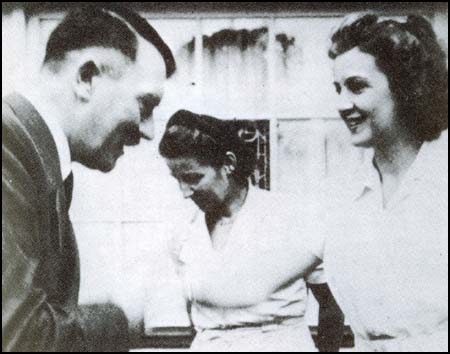
.
Geli also complained about the way Hitler controlled her life. On 8th September, 1931, Hitler left for Hamburg after having a blazing row with Geli over her desire to spend some time in Vienna. Hitler was heard to shout at Geli as he was about to get into his car: "For the last time, no!" After he left Geli shot herself through the heart with a revolver. Hitler's housekeeper, Anni Winter, reported that a torn-up letter from Eva Braun was found in Geli's room on the night of her suicide which read: "Dear Herr Hitler, Thank you again for the wonderful invitation to the theatre. It was a memorable evening. I am most grateful to you for your kindness. I am counting the hours until I may have the joy of another meeting. Yours, Eva."
When he heard the news Hitler threatened to take his own life but was talked out of it by senior members of the Nazi Party. One consequence of Geli's suicide was that Hitler became a vegetarian. He claimed that meat now reminded him of Geli's corpse. He also began to spend more time with Eva Braun. Alan Bullock, the author of Hitler: A Study in Tyranny (1962) has pointed out: "She was a pretty, empty-headed blonde, with a round face and blue eyes, who worked as a shop girl in Hoffmann's photographer's shop. Hitler met her there, paid her a few casual compliments, gave her flowers, and occasionally invited her to be one of his party on an outing. The initiative was all on Eva's side: she told her friends that Hitler was in love with her and that she would make him marry her."
Hitler's secretary, Christa Schroeder, claims that the only woman Hitler ever loved was Geli Raubal. "After the death of his niece Geli, Christmas was really a torture for him, and not pleasant for us either. It's true that he allowed a Christmas tree to be put in the corner of the hall, but Christmas carols were not sung." Geli's room was kept like it was at the time of her death and Anni Winter, the housekeeper, was the only one allowed into the room. Schroeder regarded Eva Braun as a schemer: "When he no longer had much time for her because of the electioneering, she pursued him cunningly with suicide attempts. And of course she succeeded, because as a politician Hitler couldn't have survived a second suicide from someone close to him. I say it again: the only woman he loved and would certainly have married later was his step-niece Geli Raubal."
Anni Winter, Hitler's housekeeper, remembers that Eva was often at Hitler's flat: "Eva Braun was there often when Hitler was in Munich. She was always running after him, insisting on being alone with him. She was a most demanding woman." Cate Haste, the author of Nazi Women (2001) has argued: "From the start, their relationship was conducted in secrecy, not least because Hitler did not want to be associated in public with any one woman. Eva lived at home, and her parents were strict. Hitler, almost totally preoccupied with politics, was rarely in Munich. Eva was kept firmly in the background of his life. The pattern of secrecy that began their relationship suited Hitler, and continued to its end. And so did the pattern of despair. In November 1932, Eva Braun attempted suicide by shooting herself with her father's pistol, but she then rang Hitler's doctor, who came in time to save her, and the whole thing was hushed up. Hitler came to visit her with flowers at the clinic where she was recovering. Eva, the shadowy, loyal figure at the periphery of Hitler's life, continued to be frustrated by his neglect. Hitler would turn up at unpredictable times, and his moods shifted between gushing charm and indifference."
However he still had relationships with other women Hitler was especially fond of film-stars and one girlfriend the actress Renate Mueller, committed suicide by throwing herself out of a hotel window in Berlin. Heinrich Hoffmann, Hitler's official photographer, argued in his book, Hitler was My Friend (1955) that he was not even sure Hitler had a sexual relationship with Braun: "Eva moved into his house, became the constant companion of his leisure hours and, to the best of my knowledge, that was all there was to it... Not at any time was there any perceptible change in his attitude towards her which might have pointed to the assumption of more intimate relations between them."
The historian, Alan Bullock suggests in his book, Hitler: A Study in Tyranny (1962), that Hitler was incapable of normal sexual intercourse. He quotes Ernst Hanfstaengel, a close intimate of Hitler. In his book, Hitler: The Missing Years (1957) Hanfstaengel argues: "The abounding nervous energy which found no normal release sought compensation first in the subjection of his entourage, then in his country, then of Europe... In the sexual no man's land in which he lived, he only once nearly found the woman, and never even the man, who might have brought him relief."
Eva was extremely jealous of Hitler's other girlfriends and in 1932 she also attempted suicide by shooting herself in the neck. Doctors managed to save her life, and after this incident Hitler seemed to become more attached to Eva. The problem returned and Hitler began seeing a great deal of Renate Müller, Unity Mitford and Stephanie von Hohenlohe. On her twenty-third birthday, Eva Braun again tried to kill herself. Ilse Braun suspected that her sister had to some extent staged this suicide. Eva had taken only twenty tablets of vanodorm, an amount that had little chance of killing her.
Hitler was shocked and turned up at her home asking for forgiveness. She recorded in her diary on 18th February, 1935, that he promised to buy her a house: "Dear God, please let them come true and let it happen in the near future... I am infinitely happy that he loves me so much and I pray that it may always remain so. I never want it to be my fault if one day he should cease to love me." However, in her diary on 28th May she complains: "Is this the mad love he promised me, when he doesn't send me a single comforting line in three months?"
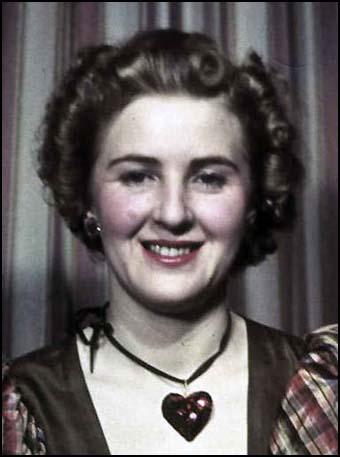
.
Cate Haste, the author of Nazi Women (2001) has argued: "Hitler could not afford another scandal over a woman's suicide. Moreover, in a perverse way, Eva Braun had shown her steady loyalty to him, the thing Hitler craved most from women. She was rewarded by being allowed to play a small part in his private, but never his public, life." Hitler refused to marry Braun. According to Hitler: "The bad side of marriage is that it creates rights. In that case it's far better to have a mistress. The burden is lightened, and everything is placed on the level of a gift."
Eva Braun was eventually given an apartment in the Reich Chancellery. However, she had to enter it through the servants' quarters. Her close friend, Henriette Hoffmann, the daughter of Heinrich Hoffmann, Hitler's official photographer, later commented: "It was furnished like a guest house, deep armchairs covered in rustic material, pots of flowers, cupboards painted with gentians, whole years' editions of film magazines. She had film stars' clothes copied, knew which star sign they were born under, and was interested in their lives." Henriette added that she often had her two dogs by her side and "was smoking fast and nervously, as she always did when she knew that Hitler was not nearby."
However, he continued to see other women including Unity Mitford. Princess Carmencita Wrede was a member of the inner-circle and does not believe Unity had a physical relationship with Hitler and was very jealous of Eva Braun. As Princess Carmencita points out: "Hitler calculated exactly the correct distance between him and Unity. Class differences were basic. Unity, Diana, Sigi von Laffert, Hella Khevenhuller, were too fine, really too aristocratic for him. Eva Braun was at his social level. My sister and I knew Eva and her sister, Gretl, well. In 1937 I was with Nevile Henderson - this idiot Henderson, Unity called him - at the Parteitag. Hitler was there, and Eva stood by herself, wearing a little raincoat. Hitler looked round and his gaze fell on her without change of expression. No other woman would have put up with that. Unity could not bear it. She was always badgering me, How is this Eva Braun? What does she have that I don't? How does she do it? She said to me, He never asks me to the Obersalzberg because Eva is always there. She's not in the Reichskanzlei, I replied, so you aren't on the Obersalzberg, fair's fair. There was a proper rivalry between them. Unity was thoroughly jealous."
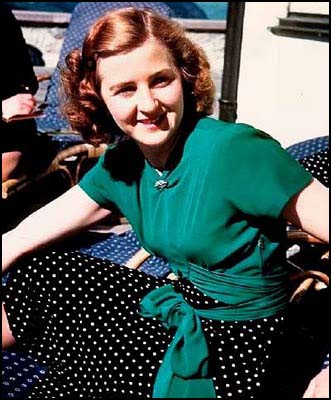
.
Eva Braun was also very jealous of Princess Stephanie von Hohenlohe. She admitted in her unpublished memoirs that her relationship with Hitler upset those around him: "Every visit of mine to the Reich Chancellery seemed to them an impudent encroachment upon their sacred privileges, and every hour that Adolf wasted upon me was an hour which he might have spent to so much greater advantage in their devoted company.... His manners are exceedingly courteous, especially to women. At least that is how he has always been towards me. Whenever I arrived or left he always kissed my hand, often taking one of mine into both of his and shaking it for a time to emphasise the sincerity of the pleasure it gave him to see one, at the same time looking deep into my eyes." Princess Stephanie admitted that they were physically intimate but they were never lovers. She claimed this was because Hitler was homosexual.
Albert Speer recalled that on one occasion, in front of Eva Braun, Hitler said: "A highly intelligent man should take a primitive and stupid woman. Imagine if, on top of everything else, I had a woman who interfered with my work! In my leisure time I want to have peace." Ian Kershaw has argued in Hitler 1889-1936 (1998): "Like his father, he preferred women much younger than himself - girls he could dominate, who would be obedient playthings but not get in the way. The two women with whom he would become most intimately associated, Geli Raubal (nineteen years younger than he was) and Eva Braun (twenty-three years younger), fitted the same model."
Reinhard Spitzy, aide to Joachim von Ribbentrop, met Eva Braun on several occasions: "Hitler wanted to be absolutely free, and she should give him a small bourgeois home with cake and tea. Hitler didn't want to have a socially high person. He could have had them, but he didn't want to have a woman who would discuss with him political questions or who would try to have her influence, and that Eva Braun never did. Eva Braun didn't interfere in politics."
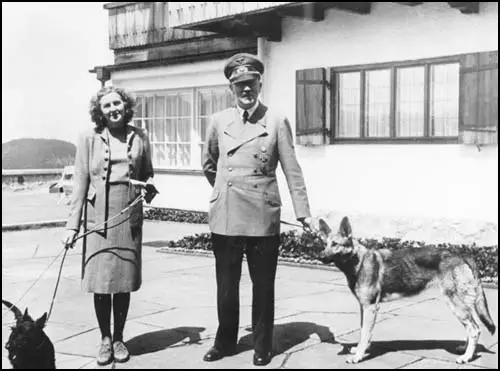
Albert Speer thought that Eva Braun was Hitler's ideal partner: "Eva was very feminine... a man's woman, incredibly undemanding of herself, helpful to many people behind the scenes - nobody ever knew that - and infinitely thoughtful of Hitler. She was a restful sort of girl. And her love for Hitler was beyond question." Eva was never seen in public with him. Any photograph that showed her face was stamped "Publication Forbidden".
The Nazi Party always attempted to keep Hitler's love life secret. In his speeches Hitler claimed that he had never married because he was "married to the German people." The severe casualties suffered during the First World War meant that there was a large number of widows and spinsters in Germany. Women in Germany found Hitler's bachelor image attractive and this helped win him votes during elections.
Reinhard Spitzy claims that Eva Braun had some privileges that enabled her to do what was forbidden to others: "She was allowed to sing, to dance, to paint her nails with red paint, and she was allowed to smoke a cigarette outside. Meanwhile, we had to go to the loo to smoke... Hitler had a very good nose, and it was forbidden to smoke. But Eva Braun was allowed everything."
Hitler also tried to persuade Eva's sisters, Gretl Braun and Ilse Braun, to give up smoking. Nerin E. Gun, the author of Eva Braun: Hitler's Mistress (1969) has argued: "He (Hitler) had also promised the ladies who went for a month without smoking a gift of a Swiss gold watch and some jewellery. Eva obtained her reward and so did about twenty other women, but Eva's sisters Ilse and Gretl and her intimate friend Herta forfeited theirs." HItler told Gretl: "Give up cigarettes, and I'll offer you a villa." Gretl replied: "My Fuhrer, a villa would be a great joy to me, but only one, whereas smoking gives me twenty little satisfactions every day, satisfactions that last and multiply."
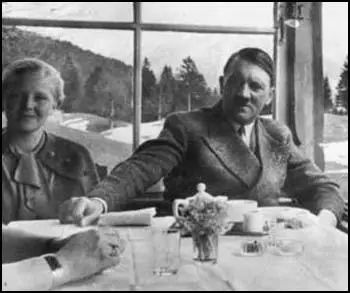
.
William L. Shirer, the author of The Rise and Fall of the Third Reich (1960) points out: "Hitler, although he was undoubtedly extremely fond of her and found relaxation in her unobtrusive company, had always kept her out of sight, refusing to allow her to come to his various headquarters where he spent almost all of his time during the war years, and rarely permitting her even to come to Berlin. She remained immured at the Berghof on the Obersalzberg, passing her time in swimming and skiing, in reading cheap novels and seeing trashy films, in dancing (which Hitler disapproved of) and endlessly grooming herself, pining away for her absent loved one."
Herbert Döhring, Hitler's manservant at the Berghof, later recalled: "She (Eva) was friendly, elegant, but she was sometimes moody and morose. Those who knew how the relationship was between them couldn't hold this against her. It was not a love affair - never. This was apparent to my wife before and after we married. She was convinced it was a friendship - a forced, necessary one." Albert Speer recalls that in 1943, Eva Braun came to him in tears, sobbing that "the Fuhrer has just told me to find someone else... he (Hitler) said that he can no longer fulfil me." Speer told Gitta Sereny: "There are no two ways of interpreting this... She made it quite clear: Hitler had told her that he was too busy, too immersed, too tired - he could no longer satisfy her as a man." Dr Theodor Morell claims that Braun asked him to give Hitler drugs which would boost his sexual appetite.
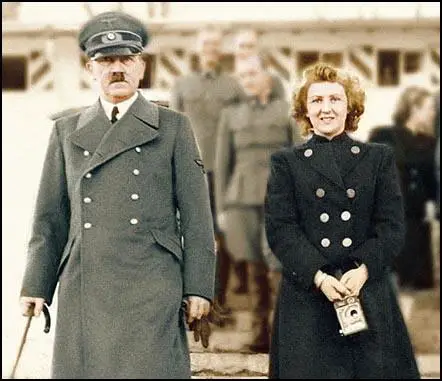
Hitler tried to find Gretl Braun a wife. His first choice was Heinz Hoffmann, the son of Heinrich Hoffmann, his personal photographer. Gretl did not find Heinz attractive and instead began a relationship with an American diplomat. When this came to an end she turned her attentions to Hitler's adjutant, Fritz Darges. Hitler's secretary, Traudl Junge, has pointed out in To The Last Hour: Hitler's Last Secretary (2002): "Gretl Braun was in love with Fritz Darges too, but a love affair with her was a little too dangerous and not private enough for young Fritz, so he hadn't been able to make up his mind." Darges was eventually sent away to fight the Red Army in the Soviet Union.
Hitler also tried to persuade Walter Hewell, a member of his intimate circle, to marry Gretl. Hewell was responsible for liaison between Joachim von Ribbentrop, the head of the Ministry of Foreign Affairs and Hitler. On one occasion Hitler described Hewell as an "excellent diplomat... one has to be to become an intermediary between Hitler and Ribbentrop". Traudl Junge has argued: "For a while those around him (Hitler) thought he wanted Hewel to marry Eva's sister Gretl Braun. But Hewel himself didn't fancy the idea." According to Nerin E. Gun, the author of Eva Braun: Hitler's Mistress (1969): "Hitler promised Hewell that after marrying Gretl he would appoint him ambassador in Rome. Hitler was so angry when Hewell married someone else he banished him from his presence. However, he eventually forgave him and he returned to his inner circle."
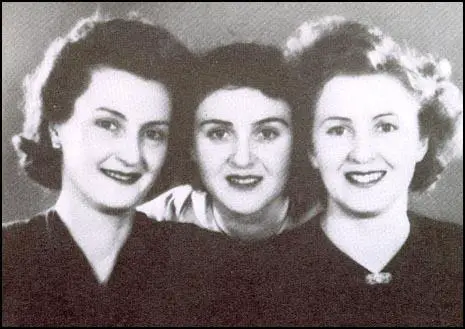
Gretl then became involved with Hermann Fegelein, who was SS liaison officer to Hitler. Traudl Junge, Hitler's secretary, later commented that Fegelein was very popular with the women at headquarters. "Hermann Fegelein was the daring cavalryman type. He had a very large nose, and wore the Knight's Cross with oak leaves and swords. No wonder he was used to women flocking around him. In addition he had a refreshing, sometimes very dry wit, and never minced his words. You felt he was a naturally frank and honest person. That helped him to forge a remarkable career quickly and unexpectedly. No sooner had he appeared than he was sitting with us at table in the Berghof. He went to Bormann's nocturnal parties, drank to the health of all the important men there, and all the women were at his feet. Those who were not his friends were his enemies until he was firmly in the saddle. He was clever but ruthless, and had some very attractive qualities, such as the honesty with which he admitted that at heart he was a terrible coward, and had won his decorations doing heroic deeds out of pure fear. He also frankly admitted that nothing was as important to him as his career and a good life."
Christa Schroeder was another of Hitler's secretaries who found Hermann Fegelein attractive and admitted that "he was a recognised heroic figure for women". According to Schroeder, so did Eva Braun. She told a mutual friend, Marion Schonmann: "A few years ago the boss (Hitler) said that if I fell in love one day with another man, then I should let him know and he would release me.... If I had known Fegelein ten years ago I would have asked the boss to let me go!" Eventually Fegelein married Gretl. Schroeder claims that the marriage on 3rd June 1944, was arranged by Eva: "Greta Braun was, as one would say today, sexy, and Fegelein might have been thinking of the advantages of one day being Hitler's brother-in-law. Thus the marriage took place and was celebrated as a great occasion on the Obersalzberg and in the tea-house on the Kehlstein."
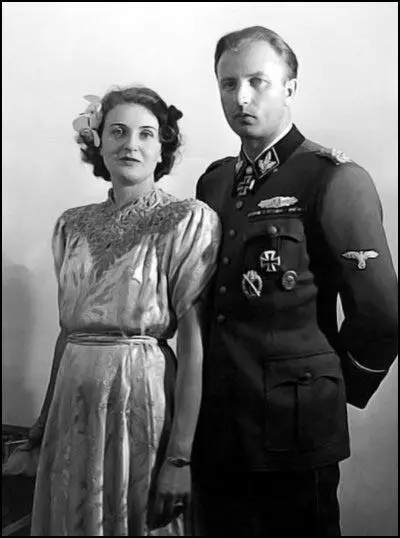
Traudl Junge complained that even after marriage Fegelein continued to try to seduce the secretaries. According to Christa Schroeder, he had a very close relationship with Eva Braun. "Hermann Fegelein was frequently amongst those who danced with Eva Braun. Today I can recall clearly the unforgettable scene. After a dance Fegelein would lift Eva chest high. At eye level they would gaze at each other full of tenderness and loving: Eva was obviously strongly attracted to Fegelein. I am convinced that her feelings for him went well beyond those feelings for a brother-in-law, but I do not believe anything went on between them."
Albert Speer called him "one of the most disgusting people in Hitler's circle." He was also disliked by Heinz Linge: "With charm and presents he inveigled himself into everybody's good books and gave the impression of having a particular standing with Hitler which was not the case, for Hitler... treated him formally and kept him emphatically at arm's length.... Fegelein... who came to regard his duties as a paid pastime and too often let it be known that he thought himself too good for the job."
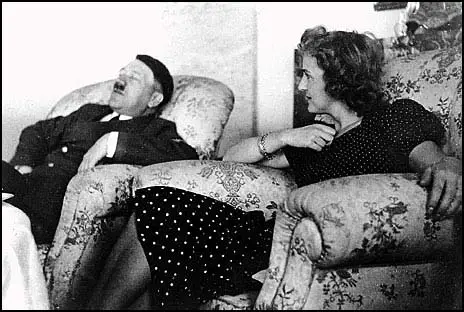
At the beginning of 1945 the Soviet troops entered Nazi Germany. On 16th January, Hitler moved into the Führerbunker in Berlin. He was joined by Eva Braun, Gretl Braun, Joseph Goebbels, Magda Goebbels, Hermann Fegelein, Rochus Misch, Martin Bormann, Walter Hewell, Julius Schaub, Erich Kempka, Heinz Linge, Julius Schreck, Ernst-Gunther Schenck, Otto Günsche, Traudl Junge, Christa Schroeder and Johanna Wolf.
Hitler was now nearly fifty-five years old but looked much older. His hair had gone grey, his body was stooped, and he had difficulty in walking. His voice had become feeble and his eyesight was so poor that that he needed special lenses even to read documents from his "Führer typewriter". Hitler also developed a tremor in his left arm and leg. He had originally suffered from this during the First World War and also after the failure of the Munich Putsch in 1923. It was a nervous disorder that reappeared whenever Hitler felt he was in danger.
The situation became so desperate that on 22nd April, Hitler sent his two secretaries, Christa Schroeder and Johanna Wolf, away. Schroeder later recalled: "He received us in his room looking tired, pale and listless. "Over the last four days the situation has changed to such an extent that I find myself forced to disperse my staff. As you are the longest serving, you will go first. In an hour a car leaves for Munich."
When the Soviet troops first entered Berlin it was suggested that Hitler should try to escape. Hitler rejected the idea as he feared the possibility of being captured. He had heard stories of how the Soviet troops planned to parade him through the streets of Germany in a cage. To prevent this humiliation Hitler decided to commit suicide. By the end of April soldiers of the Red Army were only 300 yards away from Hitler's underground bunker. Although defeat was inevitable, Hitler insisted his troops fight to the death. Instructions were constantly being sent out giving orders for the execution of any military commanders who retreated. Hitler made a will leaving all his property to the Nazi Party.
On 27th April 1945, Hermann Fegelein, who was married to Eva's sister, Gretl Braun, was arrested with his mistress in his apartment. SS-Obersturmbannführer Peter Högl discovered him with a great deal of money and discovered that he was just about to leave the country. Högl also found a briefcase containing documents with evidence of an attempted peace negotiation with the Allies. The following day the negotiations that were taking place between Himmler and Count Folke Bernadotte were leaked to the press. Hanna Reitsch was with Hitler when he heard the news: "His colour rose to a heated red and his face was unrecognizable... After the lengthy outburst, Hitler sank into a stupor, and for a time the entire bunker was silent."
According to Heinz Linge: "Fegelein was returned under armed guard he made a poor impression: wearing gloves, a leather coat and a sporty hat he looked like a Kurfurstendamm dandy. On Hitler's order he was arraigned immediately before a court-martial and sentenced to death for treason. Eva Braun, though clearly fighting an internal struggle, would not enter a plea for mercy for her brother-in-law even though Hitler indicated that he would commute the sentence on the highly decorated SS-0bergruppenfuhrer to 'atonement at the front'. Towards midnight an SS squad awaited Fegelein in the Reich Chancellery Ehrenhof. He remained impassive as the sentence of the court martial was read out."
Traudl Junge has argued that Eva Braun had asked Hitler to spare Hermann Fegelein as his wife and her sister, Gretl Braun, was heavily pregnant: "I don't know just where I was when the news reached Hitler. He may have ranted and raged one last time, but when I saw him again he was as calm as before. Only Eva Braun's eyes were red with weeping, because her brother-in-law was condemned to death.... She had tried to explain to Hitler that it was only human nature for Fegelein to think of his wife and their child, and try to help them get through to a new life. But Hitler was implacable. All he saw was deceit and treachery." Hermann Fegelein was executed on 28th April 1945.
On 28th April Adolf Hitler married Eva. Hitler tested out a cyanide pill on his pet Alsatian dog, Blondi. Braun agreed to commit suicide with him. She could have become rich by writing her memoirs but she preferred not to live without Hitler. Braun told Hitler's secretary, Traudl Junge. "Please do try to get out. You may yet make your way through. And give Bavaria my love." Junge commented that she said this "smiling but with a sob in her voice."
Heinz Linge recalled: "After the meal Eva Hitler came to me to take her leave. Pale, having remained awake all night but careful to maintain her composure, she thanked me for 'everything you have done for the Führer'. With a sad look she begged me at the finish: 'Should you meet my sister Gretl, do not tell her how her husband, Hermann Fegelein, met his death.' I never saw Gretl Fegelein again." Linge also reported that Joseph Goebbels tried to persuade Hitler not to commit suicide. Hitler told Goebbels: "Doctor, you know my decision. There is no change! You can of course leave Berlin with your family." Goebbels replied that he would stay in Berlin and die with Hitler.
Hitler then asked to see Linge: "He stood stooped, the hank of hair, as always, across the pale forehead. He had become grey. He looked at me with tired eyes and said he would now retire. It was 1515 hours. I asked for his orders for the last time. Outwardly calm and in a quiet voice, as if he were sending me into the garden to fetch something, he said: 'Linge, I am going to shoot myself now. You know what you have to do. I have given the order for the break-out. Attach yourself to one of the groups and try to get through to the west.' To my question what we should fight for now, he answered: 'For the Coming Man'. I saluted. Hitler took two or three tired steps towards me and offered his hand. Then for the last time in his life he raised his right arm in the Hitler salute. A ghostly scene. I turned on my heel, closed the door and went to the bunker exit where the SS bodyguard was sitting around."
Traudl Junge later recalled how, on 30th April, 1945, Hitler locked himself in his room with Eva Braun: "Suddenly... there is the sound of a shot, so loud, so close, that we all fall silent. It echoes on through all the rooms." Hitler's bodyguard, Rochus Misch commented: “Everyone was waiting for the shot. We were expecting it.... Then came the shot. Heinz Linge took me to one side and we went in. I saw Hitler slumped by the table. I didn’t see any blood on his head. And I saw Eva with her knees drawn up lying next to him on the sofa – wearing a white and blue blouse, with a little collar: just a little thing.” Albert Speer commented: "Eva's love for him, her loyalty, were absolute - as she proved unmistakably at the end."
Primary Sources
(1) Cate Haste, Nazi Women (2001)
Eva Braun had just completed her Catholic convent education, and was living at home with one of her two sisters and her parents, who were protective towards her. When she mentioned Hitler to her father after their meeting, he was hostile and dismissive of him. Hitler had recently moved to his larger flat in the Prinzregentenplatz, and Geli had moved in. There is little sign that Eva Braun was infatuated with Hitler, or that he paid more than occasional attention to her during 1930.
(2) William L. Shirer, The Rise and Fall of the Third Reich (1960)
Hitler, although he was undoubtedly extremely fond of her and found relaxation in her unobtrusive company, had always kept her out of sight, refusing to allow her to come to his various headquarters where he spent almost all of his time during the war years, and rarely permitting her even to come to Berlin. She remained immured at the Berghof on the Obersalzberg, passing her time in swimming and skiing, in reading cheap novels and seeing trashy films, in dancing (which Hitler disapproved of) and endlessly grooming herself, pining away for her absent loved one.
(3) Baldur von Schirach wrote about Eva Braun in a book published after the Second World War.
Eva was a worldly type of girl - bobbed chestnut-brown hair, a make-up that was unconventional for the time, fashionable pullover and short, narrow skirts, silk stockings and high-heeled shoes. I took her for a French girl. Usually she was walking a boxer dog. For me she was the most beautiful girl in Munich.
(4) Cate Haste, Nazi Women (2001)
From the start, their relationship was conducted in secrecy, not least because Hitler did not want to be associated in public with any one woman. Eva lived at home, and her parents were strict. Hitler, almost totally preoccupied with politics, was rarely in Munich. Eva was kept firmly in the background of his life. The pattern of secrecy that began their relationship suited Hitler, and continued to its end. And so did the pattern of despair. In November 1932, Eva Braun attempted suicide by shooting herself with her father's pistol, but she then rang Hitler's doctor, who came in time to save her, and the whole thing was hushed up. Hitler came to visit her with flowers at the clinic where she was recovering. Eva, the shadowy, loyal figure at the periphery of Hitler's life, continued to be frustrated by his neglect. Hitler would turn up at unpredictable times, and his moods shifted between gushing charm and indifference.
(5) Heinz Linge, With Hitler to the End (1980)
I had imagined the Fuhrer's marriage differently in earlier years. Now when it was finally held there was probably nobody who was not disappointed. There were few people present. When registrar Walter Wagner, clad in Volkssturm uniform, arrived shortly before one o'clock on the morning of 29 April, everything was ready. Hitler had had the situation conference room set up for the ceremony. At one side of the table were four chairs, one each for Hitler, Eva Braun and the witnesses Goebbels and Bormann. After the witnesses had been advised as to their role they waited with the "guests". Registrar Wagner, as excited as Eva Braun, had a two-page typed document from which he requested the contracting parties to declare that they were of Aryan origin and free of any hereditary disease which would present an impediment to the marriage. Then Wagner said in trembling tones: "I come now to the solemn act of the marriage. In the presence of the witnesses I ask you, mein Fuhrer Adolf Hitler, if you are so willed as to enter wedlock with Fraulein Eva Braun. In this case I request that you answer with Yes". Hitler did this, and then Eva Braun did so, after Wagner had continued: "Now I ask you, Fraulein Eva Braun, if you are so willed as to enter wedlock with our Fuhrer Adolf Hitler." After a concluding paragraph and the signature of Hitler, Eva Hitler, Goebbels, Bormann and registrar Wagner to the certificate, the ceremony was over.
Hitler and his bride accepted our best wishes. After they retired ninety minutes later, we celebrated with the Goebbels family, Bormann. Burgdorf, Hewel, Axmann, von Below, Hitler's secretary Gerda Christian and the personal adjutant. Champagne, sandwiches and tea were served in a fitting atmosphere.
(6) Traudl Junge, To The Last Hour: Hitler's Last Secretary (2002)
Only when Eva Braun comes over to me is the spell broken a little. She smiles and embraces me. "Please do try to get out. You may yet make your way through. And give Bavaria my love," she says, smiling but with a sob in her voice. She is wearing the Führer's favourite dress, the black one with the roses at the neckline, and her hair is washed and beautifully done. Like that, she follows the Führer into his room - and to her death. The heavy iron door closes.
I am suddenly seized by a wild urge to get as far away from here as possible. I almost race up the stairs leading to the upper part of the bunker. But the Goebbels children are sitting halfway up, looking lost. They felt they'd been forgotten in their room. No one gave them any lunch today. Now they want to go and find their parents, and Auntie Eva and Uncle Hitler. I lead them to the round table. "Come along, children, I'll get you something to eat. The grown-ups have so much to do today that they don't have any spare time for you,' I say as lightly and calmly as I can. I find ajar of cherries, butter some bread and feed the little ones. I talk to them to distract them. They say something about being safe in the bunker, and how it's almost fun to hear the explosions when they know the bangs can't hurt them. Suddenly there is the sound of a shot, so loud, so close that we all fall silent. It echoes on through all the rooms. "That was a direct hit," cried Helmut, with no idea how right he is. The Führer is dead now.
I want to be on my own. The children, satisfied, go back to their room. I stay sitting by myself on the narrow bench at the round table on the landing. There is a bottle of Steinhager standing there, with an empty glass beside it. Automatically, I pour myself a drink and swallow the strong liquor. My watch says a few minutes after three in the afternoon. So now it's over.
I don't know how long I sit like that. Men's boots have passed me by, but I didn't notice. Then the tall, broad figure of Otto Günsche comes up the stairs, and with him a strong smell of petrol. His face is ashen, his young, fresh features look gaunt. He drops heavily to sit beside me, reaches for the bottle too, and his large, heavy hand is shaking. "I've carried out the Führer's last order ... his body is burned," he says softly. I don't answer, I don't ask any questions.
Günsche goes down again to make sure that the bodies are burned without trace. I stay sitting there for a while motionless, trying to imagine what will happen now. Then, after all, I suddenly feel an urge to go down to those two empty rooms. The door to Hitler's room is still open at the end of the corridor. The men carrying the bodies had no hands free to close it. Eva's little revolver is lying on the table with a pink chiffon scarf beside it, and I see the brass case of the poison capsule glinting on the floor next to Frau Hitler's chair. It looks like an empty lipstick. There is blood on the blue-and-white upholstery of the bench where Hitler was sitting: Hitler's blood. I suddenly feel sick. The heavy smell of bitter almonds is nauseating. I instinctively reach for my own capsule. I'd like to throw it as far away as I can and leave this terrible bunker. One ought to be able to breathe clear, fresh air now, feel the wind and hear the trees rustling. But freedom, peace and calm are out of reach.
Suddenly I feel something like hatred and helpless anger rise in me. I'm angry with the dead Führer. I'm surprised by that myself, because after all, I knew he was going to leave us. But he's left us in such a state of emptiness and helplessness! He's simply gone away, and with him the hypnotic compulsion under which we were living has gone too.
Footsteps are approaching the entrance door now. The last men to prop up the Reich have been present at the pyre and are now coming back. Goebbels, Bormann, Axmann, Hewel, Günsche, Kempka. I don't want to see anyone now, and once again I go over to my bunker room in the New Reich Chancellery, down the damaged corridor. Other women have taken up their quarters here now secretaries from the adjutancy office; I know them too. They don't yet know what has happened over there, they're talking about holding out and showing courage, they're laughing and still working. As if there were any point in that!
(7) Heinz Linge, With Hitler to the End (1980)
After the meal Eva Hitler came to me to take her leave. Pale, having remained awake all night but careful to maintain her composure, she thanked me for "everything you have done for the Führer". With a sad look she begged me at the finish: "Should you meet my sister Gretl, do not tell her how her husband, Hermann Fegelein, met his death." I never saw Gretl Fegelein again. Next she went to Frau Goebbels while Hitler retired to his study. Magda Goebbels wanted another "personal conversation with the Führer", as Günsche told me. I approached Hitler and he allowed her to come. They were alone for a while. When I entered, Hitler was thanking her for her commitment and services. He asked me to remove the gold Party badge from one of his uniforms and pinned it on her in "especial recognition". Immediately after this Hitler and I went into the common room where Goebbels appeared and begged Hitler briefly to allow the Hitler Youth to take him out of Berlin. Hitler responded brusquely: "Doctor, you know my decision. There is no change! You can of course leave Berlin with your family." Goebbels, standing proudly, replied that he would not do so. Like the Führer he intended to stay in Berlin - and die there. At that Hitler gave Goebbels his hand and, leaning on me, returned to his room.
Immediately afterwards followed the last personal goodbyes. Flugkapitan Baur and SS-Sturmbanntführer Otto Günsche came, two men who had dedicated their lives to Hitler. My mouth was dry. Soon I would have to carry out my last duty. Anxiously I gazed at the man whom I had served devotedly for more than ten years. He stood stooped, the hank of hair, as always, across the pale forehead. He had become grey. He looked at me with tired eyes and said he would now retire. It was 1515 hours. I asked for his orders for the last time. Outwardly calm and in a quiet voice, as if he were sending me into the garden to fetch something, he said: "Linge, I am going to shoot myself now. You know what you have to do. I have given the order for the break-out. Attach yourself to one of the groups and try to get through to the west." To my question what we should fight for now, he answered: "For the Coming Man". I saluted. Hitler took two or three tired steps towards me and offered his hand. Then for the last time in his life he raised his right arm in the Hitler salute. A ghostly scene. I turned on my heel, closed the door and went to the bunker exit where the SS bodyguard was sitting around.
As I assumed that Hitler would put an end to his life at any moment I did not stay there long, but returned to the ante-room. I smelt the gas from a discharged firearm. Thus it had come to pass. Although I was beyond surprises, everything in me resisted opening the door and entering alone. I went to the map room where a number of people were gathered around Martin Bormann. What they were discussing I have no idea. They had no knowledge of what had happened. I gave Bormann a signal and asked him to come with me to Hitler's room, which he did.
I opened the door and went in, Bormann following me. He turned white as chalk and stared at me helplessly. Adolf Hitler and Eva Braun were seated on the sofa. Both were dead. Hitler had shot himself in the right temple with his 7.65-mm pistol. This weapon, and his 6.35-mm pistol which he had kept in reserve in the event that the larger gun misfired, lay near his feet on the floor. His head was inclined a little towards the wall. Blood had spattered on the carpet near the sofa. To his right beside him sat his wife. She had drawn up her legs on the sofa. Her contorted face betrayed how she had died. Cyanide poisoning. Its "bite" was marked in her features. The small box in which, the capsule had been kept lay on the table. I pushed it aside to give myself room.
(8) Erich Kempka, I Was Hitler's Chauffeur: The Memoirs of Erich Kempka (1951)
At that moment one of my own men came into the ante-chamber to report the placing of between 180 and 200 litres of petrol at the bunker exit. I sent the man back. As I did so, the door of Hitler's sitting room opened and personal manservant Linge shouted desperately for the fuel: "The petrol... where is the petrol," I replied: "It is in position!"
Linge returned hurriedly into the sitting room. Seconds later the door opened again, and Stumpfegger and Linge emerged carrying the body of Adolf Hitler wrapped in a dark field blanket. His face was covered as far as the bridge of his nose. Below the greying hair the forehead had the waxy pallor of death. The left arm was dangling out of the blanket as far as the elbow. Behind these two followed Bormann with the dead Eva Hitler in his arms. She was dressed in a black dress of light material, her head and blonde tresses inclined backwards. This shocked me almost more than the sight of the dead Hitler. Eva had hated Bormann. He had caused her a great deal of aggravation. Its intrigues for power had long been clear to her. Now in death her greatest enemy carried her to the pyre. I could not allow this and said to Günsche: "You help carry the chief, I will take Eva!" Then without speaking I took Eva's body from Bormann's arms. Her side was wet Instinctively I assumed that she had also shot herself. (Later Günsche told me that when Hitler's body collapsed across the table, it overturned the vase, and the water it contained flowed over Eva.)
There were twenty steps up to the bunker exit. I had not reckoned with the weight and my strength tailed. I had to stop. Halfway up Günsche hurried to assist me, and together we carried the body of Eva Hitler into the open.... The Reich Chancellery was being shelled by the Russians. There were explosions very close by. Numerous fountains of soil plumed up. The air was filled with mortar dust.
In haste, Dr Stumpfegger and Linge had placed the dead Hitler on the ground about three metres half-right of the bunker exit, very close to the giant cement mixer which was to have been used to thicken the Fuhrer-bunker roof by one metre. Just as we had carried Hitler out of his sitting room, now he lay there still wrapped in the grey blanket, legs towards the bunker stairway. The long black trousers legs were pushed up, his right foot turned inwards. I had often seen his foot in this position when he had nodded off beside me on long car drives.
Günsche and I lay Eva Hitler beside her husband. In the enormous excitement of the moment we put her at an angle to him. Russian shells were exploding around us - it seemed that their artillery had suddenly doubled its bombardment of the Reich Chancellery garden and Führer-bunker at that instant. I rushed back to the shelter of the bunker, stopping for a moment, panting, waiting for the next salvoes to arrive. Then I seized a canister of petrol, ran out again and placed it near the two bodies. Quickly I bent low to place Hitler's left arm closer to his body. His untidy hair fluttered in the wind. I took off the cap of the petrol can. Shells exploded close by, spattering us with earth and dust, metal splinters whirred and whistled above us. Again we ran to the bunker entrance for cover, our nerves stretched to breaking point. Tensely we waited for the shelling in our area to die down before pouring petrol over the corpses. Then I ran out speedily and grabbed the canister. I was trembling as I poured the contents over the two bodies, and repeatedly I told myself that I could not do it, but I was conscious of it being Hitler's last order and my sense of duty overcame my sensitivity. Alongside me, Günsche and Linge carried out the same duty for Eva Hitler. Her dress moved in the wind until finally drenched by the fuel. From the look on the faces of Günsche and Linge I saw that they were having a grim internal struggle to obey the chief's last order.
